(To ensure there’s no confusion here: I am not a lawyer, I am a writer who has an interest in this subject because I would like to not be sued or ripped off. Noble motivations, I assure you.)
Copyright, it’s a funny thing. Most people have a basic understanding of it, but that understanding tends to be fairly black and white. Some people assume that it should be mostly common sense, but that’s not always true. Things that everyone tends to “know” about the system are usually pretty subjective and can be swayed by a good legal team. And other things that people “know” may be flat out wrong in some cases.
When I wrote the post that eventually got this discussion rolling, one of those things people “knew” is that a copyright holder is obligated to sue to defend their copyright. This is an opinion that a lot of people had based on a misunderstanding and outdated information. Once upon a time, it would have been totally true (and still is in some circumstances and locales). But one of the few things about modern US copyright law that I really like is that we currently don’t require a copyright holder to do anything to maintain their copyright. You can register, but that registration is mostly meant for your future legal cases if you want to draw damages. The minute you publish original content in the US, you own it, no questions asked. A failure to register doesn’t lose you the copyright, it just makes your lawsuits a little trickier.
Instead, lawsuits are generally used to either stop an action, punish a violation, or to ensure that the right people are being paid for a work. These are entirely voluntary. That’s not to say that filing the lawsuit makes you a dick, not at all, you should have the right to defend your work. Rather, when someone says that the lawsuit was an obligation, they’re working under a false assumption. Corporations aren’t “obligated” to protect their copyright from fear of losing it since it’s nearly impossible to lose a copyright. Their lawsuits on copyright are entirely about ensuring that no one else profits from their work or prevents them from profiting on it themselves.
On the other hand, trademark law tends to be…
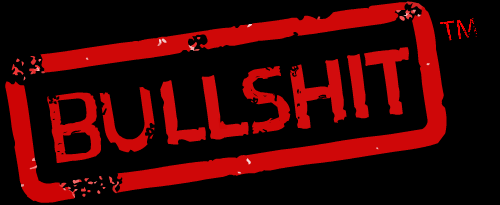
While copyright is the term most people use for all intellectual property, it’s only half the battle and each front has its own rules of war. Copyright pertains to the whole of a work rather than simply its parts and is granted automatically to the creator in the modern day. Like I said before, it’s nearly impossible to lose copyright and registration is only required for legal actions rather than holding the rights. There are limitations, however: you can’t copyright specific ideas or fragments of the whole. You can’t own a specific word, for instance, nor the ideas associated with that word. On the other hand, trademark flips that. You can totally own the trademark for specific words or ideas – but you have to register it and defend it like your life depended on it.
This is because the two were created for very different things. Copyright is ostensibly your friend, there to protect your work from being “copied” by other people without your authorization, but has to recognize that not all ideas are unique. Very few people in this world have created a language from scratch, so we have to accept that everyone writing is using at least one of the languages that predated their existence. Everyone exists in a shared culture with other people, no matter how unique you think you are, so we have to accept that multiple people will have the same ideas inspired by their respective cultures. Thus, you only own the thing you personally created with all the parts made available to you. On the other hand, trademark is meant for something far less forgiving – marketing.
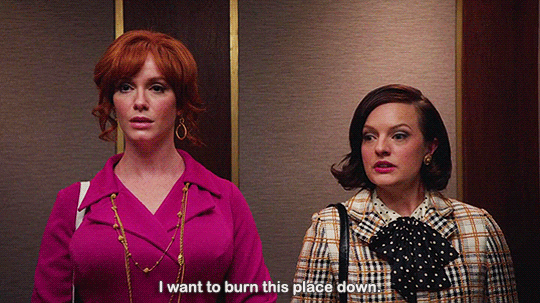
Used to essentially stake your claims on the ways you conduct your business (or “trade”), the trademark is meant to ensure that you own your specific logo, brand name, and company identity. It’s essentially the only way you can “own” a specific word or phrase and generally isn’t thought of by the public until someone does something seemingly crazy. Often, people hear about trademark lawsuits and can’t help but balk at how insane it sounds from the outside. Most trademark disputes are phenomenally petty looking from the sidelines as corporations will go after things “common sense” says they should have no say over. But, funny enough, trademark law actually forces these bullshit scenarios to happen.
When people think that a company is required or obligated to sue to maintain their rights, what they’re really thinking about is trademark nine times out of ten. In trademark law, failure to file lawsuits during the first several years of your registration is essentially the same as forfeiting the trademark itself. This can become incredibly tricky for people for a variety of reasons. But usually it means that trademark dealings can become a game of king of the mountain over words or ideas that people generally think you should not own.
And yes, I said “words”.
When someone goes forward with filing a trademark, they don’t just have to trademark the entirety of their logo or phrase, they have to trademark the individual parts too. This means that a trademark for “Chicken Shack” would require you to trademark the logo, any unique fonts you used, and the words “Chicken” and “Shack”. And good luck on that, because every other chicken place will have to have trademarked “Chicken” too, meaning any attempt to do so will generally get you into a massive cock fight.
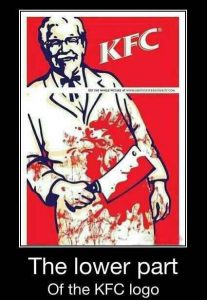
Now, that’s an oversimplification, thankfully, because many words are considered too generic to trademark. If that weren’t the case, our legal system would devolve into greater chaos than it already has. But the premise itself is still true – registering a trademark will result in having to register the whole thing down to the word, and there’s a damn good chance you’re going to have to fight for it. Preparing for that fight includes all sorts of crazy shit that you have to be mindful of. The words you use, the phrases you attach to it, colors you choose, even the shapes are all aspects of your trademark. As we speak, The Walt Disney Company literally owns a collection of circles that you’re not allowed to use in a commercial manner without expecting them breathing down your neck.
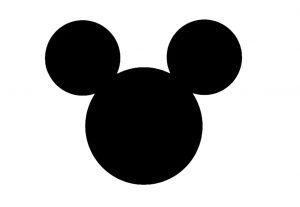
Unless done in this way.

Because this arrangement of circles (and usually the black, but not necessarily so), is identified as a reference to one of their iconic characters. Nevermind the fact that the iconic character is basically a water molecule with a face, they own that arrangement – until you identify that it’s the molecule. After throwing in identification of the two hydrogens and one oxygen atom into the mix, Disney no longer owns that shape anymore. Because, while they can sue the living hell out of you for so much as invoking the shadow of their mouse, they don’t own water – Nestle beat them to the punch.

These sorts of peculiar turf wars aren’t necessarily because they’re being dicks (though it sometimes certainly helps). The law says that trademark has to be defended religiously, especially in the first five years. For five years, every aspect of your trademark must be defended as if it were your life because not defending it would be the same as invalidating the trademark. This is particularly crushing in some instances because if one aspect of your trademark is invalidated you basically lose the whole damn thing. As a result, some companies have made lawsuits which did them a little more harm than good – forced on them by the way the law currently works. For a good example, there’s King.

King Digital Entertainment is a social game developer out of Ireland and statistics say that if you have a Facebook account you’ve either played one of their games or considered becoming a hermit to put an end to the invites. Along with Zynga and a handful of others, King is one of the primary reasons why your friends keep sending you invitations to join what seems to be a growing cult. But King’s claim to fame and curse unleashed on the Earth would be a little gem (but not literally, so Bejeweled can’t sue) called Candy Crush Saga.

Now, King’s not exactly a well-liked company, but what really started to set people on edge was their trademark of that name “Candy Crush Saga”. You see, King was particularly interested in protecting the use of the words “Candy” and “Saga” in games and they’ve gone on to release dozens of “Saga” games in the years since first releasing it. But along the way they happened to run afoul of other developers who were using the term (a fairly common word if you look around enough), including an indie darling by the name of The Banner Saga.

When the news hit the internet, the whole gaming world decided that King had massively overstepped its bounds. King’s entire game catalog at the time was essentially propped up by cloning successful game models and adding little twists to them and most gamers knew this. The idea that they would try to claim they were the originators of anything was galling at best. But this sentiment was particularly inflamed by the fact King said that The Banner Saga, a viking-themed Tactical RPG, was “deceptively similar” to their games – which at the time consisted mostly of moving candy or other objects around on a screen. The gaming world beyond Facebook saw no other option but to start digitally burning King in effigy.
But there was a problem: it wasn’t King’s fault.
That’s not to say that King was a bastion of original thought, far from it, but the law said they had to do it if they wanted to maintain their trademark. And, while the word “Saga” certainly describes a Viking RPG better than candy, it’s a word that King really likes to use on their games. As of this writing King has released a total of 16 games with the word “Saga” in the title over the span of 5 years. Losing the word, even if it doesn’t really fit their particular genre of games, would have been devastating to their trademarks. In the end, King had little choice but to make their opposition sleep with the Swedish Fish.

Now, to be fair, even after explaining that I can understand it would still sound like bullshit that King could own the word “Saga”, which can be found almost anywhere. But King specifically wanted to trademark the word for games and most famous uses of the word have existed in film and literature. Trademarks can be targeted to a specific market, and this is a loophole a lot of people have used in the past to avoid conflict with bigger animals. One famous example is one that a lot of you are probably pretty familiar with – Apple.
You see, Apple Computers back in the day were the little guy, a tech startup looking to produce cheaper computers (things change). Their first computer was the Apple I, their second was the Apple II, and so on and so forth. To this day one of their primary product lines is called the Mac, short for Macintosh, and that’s just how things are today. Apple is no longer the little startup, they’re an international tech powerhouse. But back in the late 70s when Apple was still the little guy, they came into conflict with a company that some would say was “bigger than Jesus”.

And for a bit it looked like the little guy was about to be turned into cider. However, a settlement was reached for an undisclosed amount (later said to be $80,000) and the two went their seperate ways. The settlement in question was hinged on that loophole I was talking about previously. Under the agreement, Apple Computers could keep their juices on the inside provided they paid their settlement and both companies agreed to stay on their own turf. As a result, Apple Corps was never allowed to enter the computer business so long as Apple Computers never entered the music business.
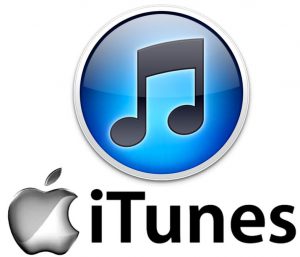
And such an agreement is pretty big considering the players involved. Apple Computers really got incredibly lucky and Apple Corps could have been considerably more brutal. Likely the only reason we know what an iPhone is today is because the Beatles were willing to accept that “Apple” was a pretty common word that could be shared. But the law really doesn’t let this happen too often, and sometimes that can devastate someone who tries to file for the wrong trademarks. Generally this would be because you would wander on the turf of a large entity, but sometimes, you can screw up by trademarking something the community as a whole will not accept.
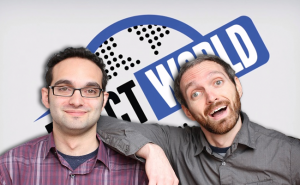
This was a lesson learned by the Fine Bros of the “React” series of YouTube videos. Seeing an opportunity to try to expand their reach they determined they should start up something called “React World”. React World was a simple (if misguided concept) of trying to apply franchising to YouTube videos. Under their plan, they would allow people to make videos in their exact style and get a cut of the revenues. However, this meant that they had to trademark “React” and, for the first time in their careers the Fine Bros learned that reaction videos weren’t necessarily their friends. You would understand their surprise, as reactions had been the backbone of their professional lives before those videos turned on them like a white tiger at a magic show. So being on the receiving end wasn’t too comfortable for them.
And, despite the protests of the Fine Bros, the people who attacked them were somewhat right to get upset. For all the talk of not wanting to become draconian about the word “React”, the act of filing the trademark was going to require them to come down on other channels with similar content. They would have to fight others for that word, just like Apple Records, just like King, just like any number of other companies, in order to maintain the trademark. So, when enough people had put out the word on that and demonstrated the danger to original content, something worse than angry YouTubers happened – they lost subscribers. Within weeks the Fine Bros managed to lose more subscribers than most channels would ever have, and by the end…
They had no choice but to give up that mountain.
(I write novels, this blog, and tweets. So far, no trademarks. But I assure you, when I do, I will regret it later.)


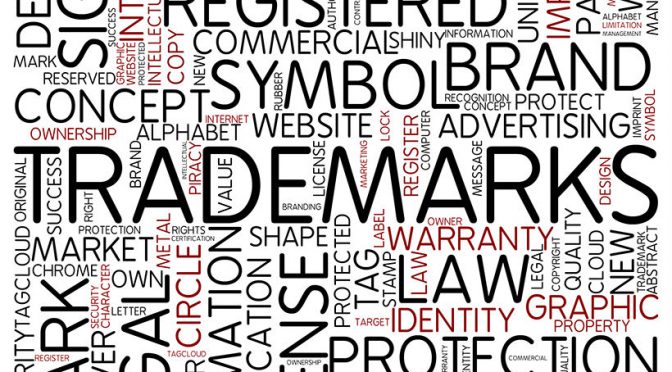





I have a big question for you about the service that you have?, my question for you is this:? What if i want to build a real star ship will you back me up from paramount studio and cbs from takeing it a away from me and have them take it as there own?. Get back to me with your answer ok please? My name is kenny smith from ca.
Congrats on most original comment out of the hundreds I’ve gotten on this subject. Unfortunately, there’s two problems with your question.
First, I’m a writer who happens to have an invested interest in knowing something about copyright and trademark law (to cover my own ass) – not a lawyer. I have no services to speak of to offer to someone who has a legal issue. Second, if you build a star ship copyright and trademark laws have zero to do with what you did. For that you’d have to worry about patent trolls (maybe).
Good luck on the star ship, hope you get it working.